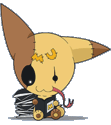It sounds like you are confused on how to develop your characters, how to structure your story, and (by the vagueness of your question) I'm assuming you are also confused on the general direction of your story. Ask ten different professional authors on how to solve these problems, and you'll get ten different answers. You'll have to search for an approach that works for you. And the best way to start is seeing how the people who do this for a living do it. It doesn't matter in what medium you write (whether a script, novel, manga) or what genre it is (whether it is science fiction or romance). The basic principles on how to write stories are the same.
On that vein, I wrote some sites below that I found personally helpful:
Jim Butcher, the author of the Dresden Files, gives a quick crash course on how to develop character, how to determine the main conflict of your story, how to determine which scenes go when, what happens in a scene, and more in the site below. His brief guide is invaluable source for a good foundation on writing a story.
http://jimbutcher.livejournal.com/Gail Carson Levine, the author of Ella Enchanted, has her own blog that gives amateur writers advice on writing. Each post talks about common problems beginning writers have: from how to get ideas on what to write next, to building characters, to writing believable dialogue, and everything in between.
http://gailcarsonlevine.blogspot.com/2012/05/open-ended.htmlBeginnings, Middles, and Ends by Nancy Kress
This book offers invaluable advice and insight to building a story and is written in such a relaxed casual style that it never comes across as boring. Scratching the surface, it teaches how to make an interesting opening scene, how to keep your story going through the middle, and how to make a satisfying ending.
Fundamentals of Fiction Website
http://www.writing-world.com/fiction/fiction01.shtmlNot sure who wrote this, but I found the advice practical and useful bird's eye view on writing stories. And (later on in part 2) it gives you more perspective on what writers think about when reading other stories.
Now, I want to point out that Gail Carson Levine and Jim Butcher have two completely different styles of writing their stories. Gail mentions frequently that she figures out the story she wants to tell and who her character are, as she goes along, with little pre-planning. Jim Butcher goes in different direction, offering great ideas on how to plan out your story from beginning to end, and while you don't have to stick to it, having a deep understanding of where your story can go can make your job much easier. Nancy Kress is sort of the middle ground, where you plan and write as you go along. The fourth site sort of brings a different perspective, that echoes a lot of the advice from all three of the ones I mention while at the same time providing new insights. I consider these four resources to being great informative, instructive guides in writing my own stories. I hope that the resources can provide some small insight to you.


